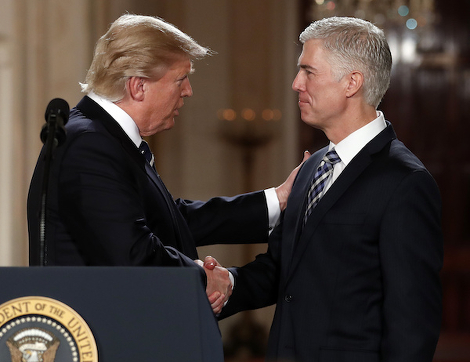
It’s been a whirlwind of activity since Donald Trump took office on Jan. 20. In one of the more startling moves, Trump moved quickly to nominate a conservative judge and law professor to fill the vacant seat on the Supreme Court that was left behind when Antonin Scalia passed away one year ago this month. Read below for a fair profile of Trump’s pick.
By Mark Anderson
To the applause of conservatives around the U.S., President Donald Trump on Jan. 31 nominated 10th Circuit Court of Appeals Judge Neil McGill Gorsuch to fill the vacant seat on the Supreme Court. Gorsuch, 49, would be the youngest high-court justice to be nominated in 25 years.
“Judge Gorsuch has a superb intellect, an unparalleled legal education, and a commitment to interpreting the Constitution according to its text,” Donald Trump tweeted Tuesday evening, following the announcement.
This description suggests that Trump, who initially had fielded as many as 21 candidates to nominate for the high court, was seeking a strict constructionist—a judge who objectively reads the Constitution the way the framers wrote it—instead of conjuring up “penumbras” and making highly subjective rulings, as happened 44 years ago when the high court, in the Roe v. Wade case, somehow interpreted the Constitution to justify invalidating state laws prohibiting abortion.
In terms of touchy social and cultural issues, Gorsuch, an Episcopalian, appears to share the beliefs of the late Supreme Court justice whose seat he will fill pending Senate approval, Antonin Scalia, a Catholic and strict constructionist known for staunch pro-life stances.
Bug Out While You Still Can! Learn More…
On Feb. 13, 2016, the nation was shocked when Scalia was found dead in his bed in deep southwest Texas while staying at the remote Cibolo Creek Ranch in Presidio County, owned by noted Houston businessman John Poindexter. Scalia was 79. According to the orthodox press and authorities, he died of “natural causes.”
The high court has been operating with eight justices ever since. Liberal-leaning Merrick Garland, who was nominated by President Barack Obama nearly a year ago to fill the ninth slot, at first appeared to have a good shot but was turned back by Republicans.
In 2009, Gorsuch wrote a book that argues against legalizing assisted suicide and euthanasia, showing that life issues are paramount to him, though critics fear he may go too easy on corporations and let big business continue to sway campaign finance and electoral politics.
Referring to the views of Faith & Freedom Coalition Executive Director Timothy Head, Newsweek online noted: “Gorsuch is in line with the conservative group’s concerns on faith, life, and religious liberty, and how those issues relate to healthcare and small business practices.”
President George W. Bush nominated Gorsuch to the Colorado-based 10th Circuit in May 2006. By unanimous vote, the Senate later confirmed his appointment.
“His mother, the late Anne Gorsuch, was the first female director of the U.S. Environmental Protection Agency under then-President Ronald Reagan,” reports Newsweek.
A Denver native, Gorsuch has University of Oxford, Harvard Law School, and Columbia University degrees. Having started his legal career in the early 1990s, he was a law clerk to Supreme Court Justices Byron White and Anthony Kennedy, and also to Judge David Sentelle of the U.S. Court of Appeals for the D.C. Circuit.
Married with two daughters, Gorsuch lives in Boulder. There, he is a University of Colorado adjunct law professor.
BIG BUSINESS TIES
End Citizens United’s Tiffany Muller, who heads the group’s political action committee (PAC) that supports reforming the campaign finance system, says there are plans to contact senators to urge them to vote against Gorsuch’s nomination. The high court’s January 2010 Citizens United decision allowed super PACs to spend unlimited money to support or oppose candidates.
“Our concern is that we have seen with this nominee a continuation of the same type of precedent that we saw in Citizens United, and dark money groups are already announcing that they’re going to do big ad-buys to prop up this nominee,” Ms. Muller was quoted as saying.
On the positive side, Gorsuch has a record as a proponent of states’ rights over federal power, appears to be generally pro-Second Amendment, and opposes judicial activism, which includes opposing the idea of judges making rulings based on their personal convictions instead of the letter of the law. In a 2005 National Review article, Gorsuch argued, “American liberals have become addicted to the courtroom, relying on judges and lawyers rather than elected leaders and the ballot box as the primary means of effecting their social agenda.”
Gorsuch added that, in so doing, American liberals are circumventing the democratic process on issues like gay marriage, school vouchers, and assisted suicide, leading to a compromised judiciary that has lost its independence.
Considering that senators such as Charles Schumer (D-N.Y.) and Dick Durbin (D-Ill.) during floor action on Jan. 30 said that the confirmation of Trump’s nominee for secretary of state, Exxon-Mobil CEO Rex Tillerson of Texas, might be held up because Democrats and some Republicans are angered by the president’s executive order for temporary travel restrictions affecting seven nations, the confirmation of Gorsuch may not exactly be automatic in the hyper-partisan climate on Capitol Hill.
Mark Anderson is AFP’s roving editor.

